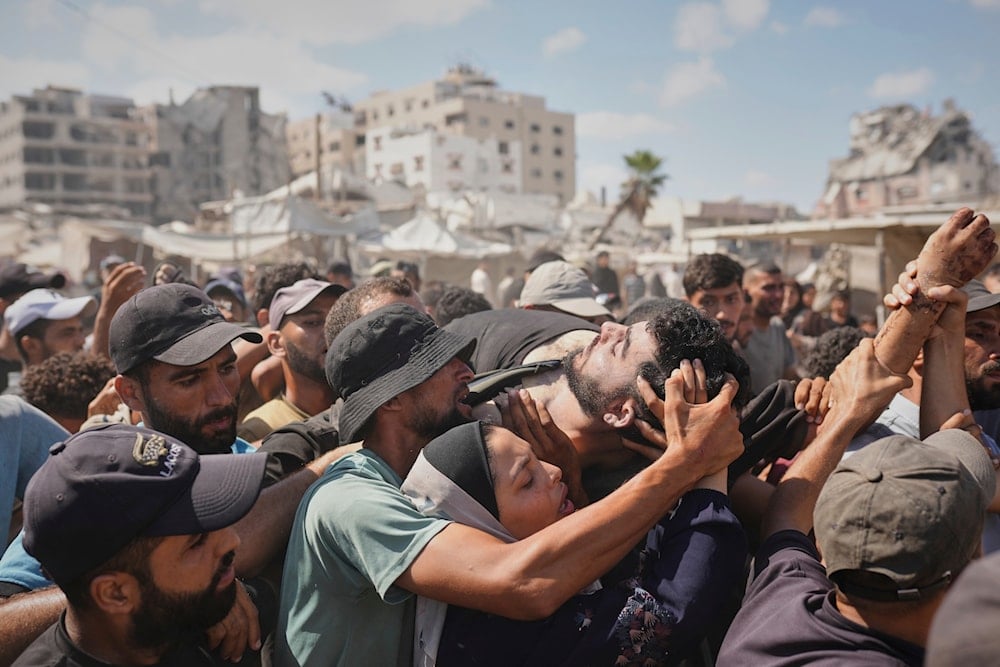'Israel' reopens Zikim crossing to long-awaited Gaza aid
"Israel's" COGAT reopens Zikim crossing to allow UN aid into northern Gaza, where agencies warn of famine-level conditions despite the recent ceasefire.
-

Mourners carry the body of a Palestinian man who was killed while trying to reach aid trucks entering northern Gaza through the Zikim crossing, at al-Shifa Hospital in Gaza City, on July 31, 2025. (AP Photo/Jehad Alshrafi)
The Israeli occupation's Coordinator of Government Activities in the Territories (COGAT), the arm of the Israeli military responsible for overseeing the flow of aid, announced on Wednesday the reopening of the Zikim crossing in the northern Gaza Strip to allow the entry of humanitarian aid trucks.
The decision follows repeated calls from United Nations agencies to reopen the crossing to facilitate the delivery of aid to northern Gaza, where hundreds of thousands of Palestinians remain in desperate need following months of blockade and bombardment.
According to the United Nations Office for the Coordination of Humanitarian Affairs (OCHA), the Zikim crossing was closed on September 12, preventing aid organizations from bringing in essential supplies for nearly two months.
Although limited aid has entered through southern crossings, humanitarian agencies say the needs in northern Gaza, including Gaza City, remain critical. The Global Hunger Observatory has classified the situation as at famine level, warning that prolonged shortages of food and medicine are endangering civilians.
The reopening of Zikim, therefore, marks a key development in efforts to restore humanitarian access to the hardest-hit areas following the Gaza ceasefire.
In a statement, COGAT said the reopening came “in accordance with instructions from the political level.” It added that all aid would be transferred through the United Nations and international organizations, following a "detailed security inspection" by the Security Ministry’s Land Crossings Authority.
Gaza's death trap
Israeli forces have repeatedly targeted Palestinians gathering at designated aid distribution sites in Gaza, resulting in thousands of martyrs and injuries as aid seekers fell victim to what reports described as deadly "aid traps".
According to the Gaza Health Ministry, almost 3,000 Palestinians have been killed and more than 19,000 wounded while attempting to obtain humanitarian aid at these so-called safe zones and distribution points, with Israeli snipers, airstrikes, and drone attacks systematically targeting crowds waiting for food and water.
Reports highlighted several major attacks, including a massacre in Rafah where more than 30 civilians were killed during an aid handout and incidents in Khan Younis and Gaza City where dozens were martyred after Israeli forces opened fire or launched strikes directly on or near crowds of starving Palestinians. These actions reduced critical aid procurement to deadly gambles, with bread lines and aid convoys becoming frequent sites of mass casualties.
Reports detailed that the targeting of aid seekers is embedded in a broader Israeli strategy of forced starvation and collective punishment against the population of Gaza, effectively turning the provision of aid into a form of warfare. Rights groups and humanitarian observers accused Israeli authorities of deliberately engineering conditions of famine, likening the situation to an “orchestrated theatre of precarity” where even efforts to secure aid are militarized.
These so-called “aid corridors” have drawn international condemnation, yet Israeli attacks persisted, killing, wounding, and traumatizing thousands of Palestinians who gathered with the desperate hope of feeding their families.
UNICEF says vital child vaccines blocked
On a related note, on Tuesday, UNICEF warned that essential supplies needed for a mass vaccination campaign in Gaza are being denied entry by the Israeli occupation, hindering efforts to reach children in the war-ravaged territory. The organization said items, including syringes used for routine immunisations and bottles for baby formula, remain held at checkpoints, despite an ongoing ceasefire and growing humanitarian needs.
UNICEF stated that it is currently conducting a catch-up vaccination campaign for children under three, many of whom missed routine immunizations over the past two years. However, it faces severe difficulty securing access to 1.6 million syringes and solar-powered refrigerators required to safely store vaccine doses, with the supplies awaiting approval by Israeli forces since August.

 4 Min Read
4 Min Read








